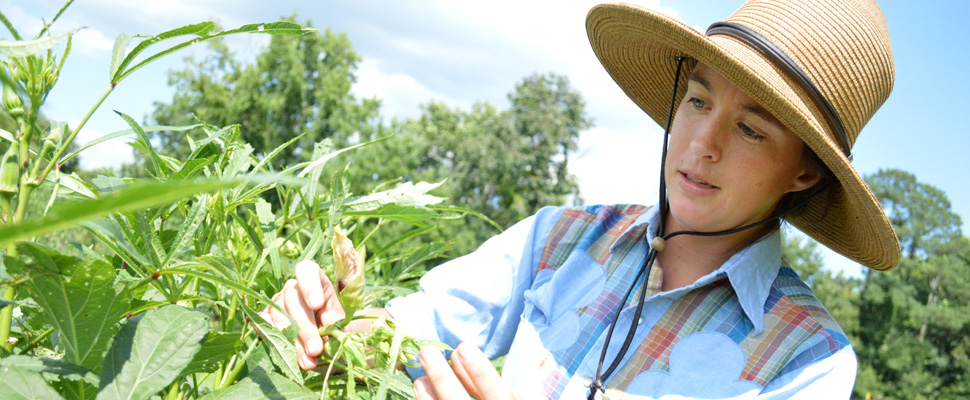There’s always a person behind the fruits and vegetables you eat. On NC State’s Agroecology Education Farm, that person is farm manager Alison Reeves, who oversees the planting, growth and harvest of hundreds of pounds of produce each season.
We were curious what goes into being a farm manager, so we asked Alison to dish on a typical week at the helm of this six-acre farm off Lake Wheeler Road in Raleigh. What exactly does it take to grow the food that ends up on our dinner plate?
Weeds, weeds and more weeds
First things first – Mondays are for weeding and pest management triage. On a farm that limits chemical and pesticide usage, bugs and weeds can wreak havoc on harvest, so it’s important to stay ahead of the game. That’s why Alison and two farm assistants spend Monday morning walking crop rows. They weed as they walk, ensure no big problems are developing and even squish insect eggs to prevent future pest outbreaks.
For Alison, the farm assistants and volunteers who help at the farm twice each week, the war on weeds is constant. All week long there’s mowing, weed-eating and mulch spreading to be done. About the only automated task at the farm is irrigation, which is done via a drip irrigation system that limits water waste and prevents the spread of diseases that overhead sprinklers cause.
Non-chemical weed and pest management techniques are being tried all the time. This summer Alison is experimenting with solarizing techniques, which involve covering weeds with clear plastic sheets and allowing the sun to roast the unwanted vegetation underneath.
Harvest Time
For a farm manager, harvest is when all this hard work is rewarded with ripe produce. Even with just a half acre in production, hundreds of pounds of fresh fruits and vegetables are harvested at the farm and eventually served in campus dining halls and other venues.
Planning for Plants
Amid the splendor of harvest, planning efforts build for future seasons. Seeds are started in the greenhouse so they can soon be planted in the field, and new season extension technology is researched for its potential to increase the farm’s produce yield. For example, building a hoop house, which works like a greenhouse, would enable plants to grow about a month longer than they could outside, meaning fall season crops such as kale, broccoli and chard can be grown into early winter. And as you might expect, maximizing produce yield is among a farm manager’s highest priorities.
Elevating Education Efforts
This farm isn’t just about produce yield. Alison is committed to educating campus and the community about agroecology, and she often works with NC State agroecology students, crop science classes and student organizations. She leads volunteer days at the farm, hosts K-12 students for farm tours and has launched a series of educational workshops on topics such as natural dyes, honey extraction and building a pollinator garden.
That’s all in a week’s work for just one farm manager. So next time you pile your plate high with fruits and veggies, be thankful for the farmer that made that meal possible.
